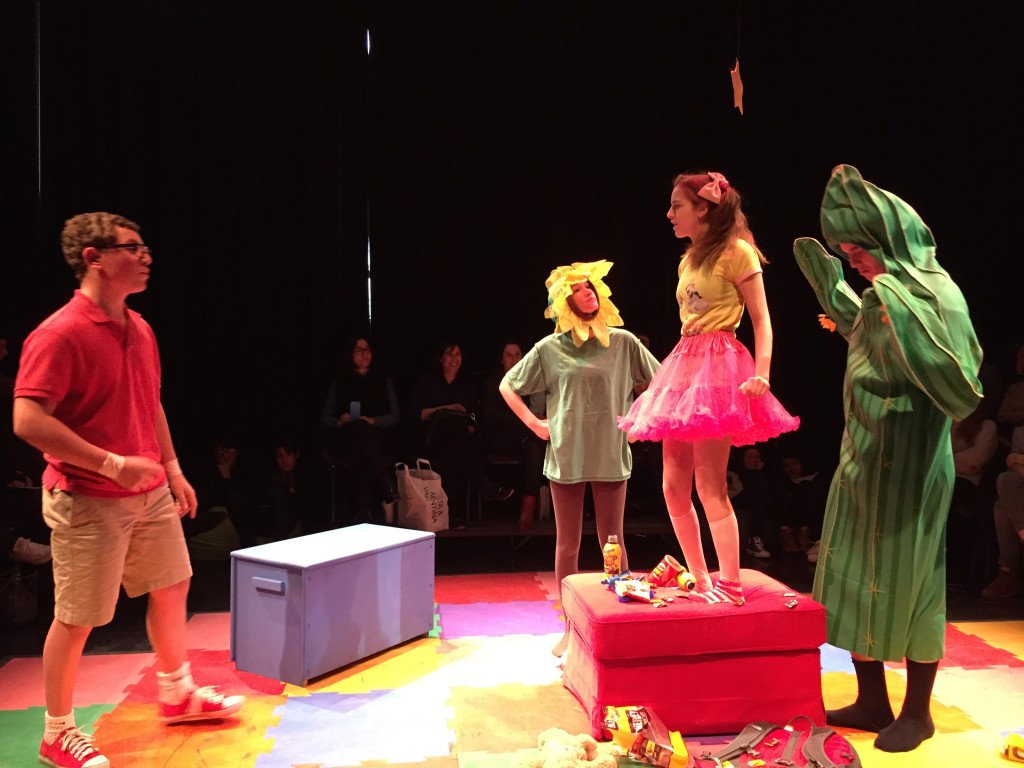
“You’re not leaving me for a toddler,” shouts Mr. Marmalade, the coke snorting, beer chugging, and abusive imaginary friend played by Adam Ettelbrick (VI) and born from the mind of Lucy, a four-year-old girl. In this dark comedy set in New Jersey, nothing is off-limits in the imagination of this precocious toddler. The audience is left juggling two worlds: one of rainbows, tea parties, teddy bears and preschool innocence and the other, the harsh adult world of Mr. Marmalade.
Mr. Marmalade was written by Noah Haidle and directed by Eva Neuwirth (VI).
“I had a really hard time choosing a play to direct. I knew I wanted a small cast, and wanted something that would be somewhat relatable to teenage actors. The themes of childhood, corruption, and imagination are totally universal. Most importantly I wanted something that would be as fun for me as it would be for my actors, and designers.”
The actors definitely had fun and it was the range of actors, especially the underclassmen, that made this show such a success. Sarah Sugg (IV) played Lucy, the four-year-old protagonist of this tale who manages to be equal parts whiny, tantrum-y, and wise beyond her years. Will Schiller (III) is an actor of considerable bravery. Schiller plays Larry, a five year old who has to repeat preschool because he stole coins from a bunny-shaped piggy bank containing the class pizza party fund.
Larry is also known for the “youngest suicide attempt in the state of New Jersey.” He and Lucy make fast friends when she performs an imaginary heart transplant and then asks him to remove all of his clothes for “further inspection.”
In what world does a five year old know how to slit his wrists? What kind of a child decides that her imaginary friend (Mr. Marmalade) abuses his personal assistant Bradley (played by Jefferson Randall (V))?

Sarah Sugg (VI), who plays “Lucy,” after she’s killed her child
Milena Siegerson (III) and Adlai Coleman (VI) played all of the supporting roles holding the play together, providing comic relief and movement. Siegerson, a very talented and impressive freshman in her second Studio Theatre show this year, managed to effortlessly fill the shoes of Lucy’s laissez-faire single mother, Emily the irresponsible teenage babysitter and Sunflower, one of Larry’s imaginary friends. Coleman, in his theatrical debut, plays George, the thuggish boyfriend of Emily and mean older brother of Larry as well as Bob, the overnight lover of Lucy’s young mother and Larry’s imaginary friend Cactus.
What is so real about the entire fantasy of this play is that Lucy and Larry, as messed up as they may be, are just lonely kids in search of a playmate. They want nothing more than to play house or doctor or host tea parties, even if it is with a bipolar, abusive, neglectful businessman. It is the kind and trusty Bradley who shines through in the end. During an interview Neuwirth admitted, “I have a soft spot for Bradley, Mr. Marmalade’s personal assistant. He’s a really comforting and constant figure in Lucy’s life and I think he’s often taken for granted.”
In what world does a strange man in a suit take a little girl to Mexico on a romantic vacation? Or snort lines of cocaine on a toy chest? Mr. Marmalade challenges our perceptions of childhood and adulthood and demonstrates that there is more overlap than one might assume. Neuwirth writes in her Director’s Note, “Mr. Marmalade is a play that gives validity to the imaginary, and the ways that it can infringe on our reality; both as a fantasy and as a nightmare.”
The play briefly visited Off-Broadway in 2005 at the Laura Pels Theater, starring Michael C. Hall, famous for his roles in Six Feet Under and Dexter, as Mr. Marmalade and Mamie Gummer (one of Meryl Streep’s daughters) as Lucy. In an edition of the New York Times critic Charles Isherwood writes, “Mr. Haidle has invited us down a rabbit hole that really leads nowhere. In between the tea parties and naughty games of doctor, Lucy carries on so many complex conversations about concepts (suicide, infidelity) blatantly beyond a 4-year-old’s intellectual capacity that her nightmare world retains no grip on our imaginations or our emotions.”
After a brief scene of Mr. Marmalade and Lucy’s married life, Mr. M turns grim again, pushing Lucy to murder their newborn child. Bradley enters later, briskly announcing Mr. M’s suicide and handing Lucy the note he left, to which she whines, “I still can’t read!” reminding us of her easily forgotten infancy.
As talented as the actors were and as well directed and staged the play was I had trouble fully immersing myself in this twisted comedy. Neuwirth summed it up perfectly.
“It’s a dark comedy but to me it’s also bittersweet” she said. “At it’s heart I think it’s about growing up. Sort of like a puff the magic dragon story.”






